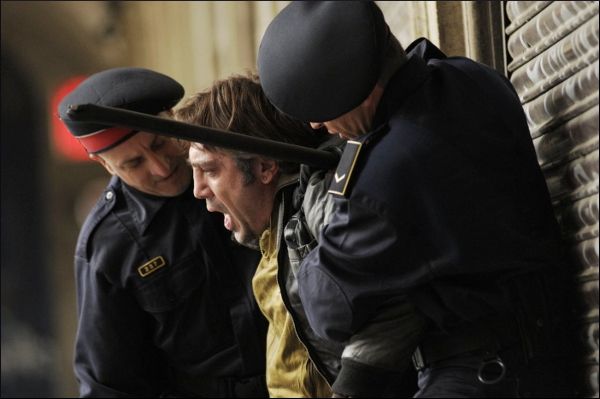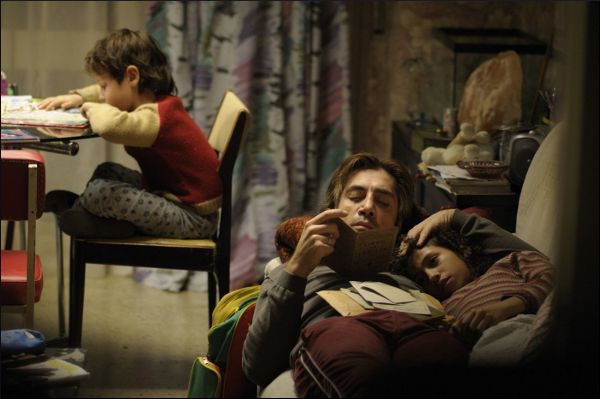Biutiful is a passionate drama set in the Spanish city of Barcelona, by the Mexican director Alejandro González Iñárritu. It tells the life of Uxbal (Javier Bardem), which is not at all perfect. He has to look after his two children as he maintains a sad, intermittent relationship with his bipolar wife, Marambra (Maricel Álvarez). Uxbal's business is trafficking illegal immigrants, though at the same time he wants to help them. As if all this was not enough, he has the rare ability to hear dead people. He is able to listen to what they say or what they said just before passing away. Amidst his stormy life, he is diagnosed with terminal cancer, and Uxbal has to balance his life, resolve moral issues, and amend his mistakes as thoroughly as possible before death catches up with him.
"Biutiful is a passionate drama set in the Spanish city of Barcelona, by the Mexican director Alejandro González Iñárritu."
With an exceptional Javier Bardem in the lead role, Biutiful is hard to improve upon. It is a special film in many ways, namely because of its ability to deal with a wide range of different topics which are perfectly integrated into the main storyline. These include: illegal immigration (nowadays a real issue in any developed country), child abuse, the fight against cancer, corruption, dysfunctional families, drugs, homosexuality, and paranormal phenomena. Perhaps this is the reason why the movie is called Biutiful, hinting at beauty’s imperfection. Nothing is perfect in this world, and even beauty has flaws.

Above all, we should praise the main character’s integrity. He faces a big tragedy with seriousness, and is able to pretend otherwise and smile in front of his children, as if nothing were happening. He must take care of the house and his family, and he must cope with his illegal business, his unclear relationship with the police, and the moral issues brought up by his line of employment. He feels horribly guilty after buying cheap heaters for the illegal factory where the Chinese immigrants work, which causes all of them to die in their sleep when it fails. Uxbal looks for some comfort in the only person he knows he can rely on, a spiritual woman who in the past helped him discover his gift. Only to her can he reveal his guilt, since his wife is a drug addict and his children are still too young to understand.
As mentioned above, the movie also deals with the sensitive topic of homosexuality. In some countries, such as China, homosexuality is still seen as a mistake. The two Chinese protagonists maintain a clandestine homosexual relationship, and it’s suggested they left their country “for love.” When it comes to abuse, it is the youngest of the children who suffers it from his mother. Marambra is an immature, self-centered woman, who punishes her son by not allowing him to go on a family trip, leaving him home alone for several days, or by mistreating him because he does not get along with his sister. Since he still loves her, they go back to live together on several occasions, only to separate again after a while. Uxbal is the one who always takes the children with him.
"The movie is a sad reflection of the social drama behind a large number of immigrants in Spain, as well as of the tragedy of broken families where all the pain and hardship falls on the children."
When Uxbal’s health begins to worsen, Ige (Diaryatou Daff), a black immigrant woman who does not have a place to live, moves in with them. Her own family has been put in jail and she has to care for a little baby. Uxbal knows his time is close, so he gives her money to pay the rent and look after his children. At one point, she is tempted to run away to Africa with the money, because she knows there is nothing left for her in Spain.
The movie is a sad reflection of the social drama behind a large number of immigrants in Spain, as well as of the tragedy of broken families where all the pain and hardship falls on the children. It is a story about the remorse felt by people who do not mean any harm but who are led into situations in which they were unable to make anything better.
In terms of accents, the movie shows a meaningful variety. Since the story is set in Barcelona, we can sometimes see brands and street signs in Catalan, although the movie mainly uses the neutral Castilian accent, in an extremely informal register used on the streets, with words such as “pirarse” (leave) or “colega” (friend). Maricel Álvarez, the actress who plays Marambra, also has a light Mexican accent (and her name is not Spanish anyways) and, rounding up the linguistic diversity, some scenes are in Chinese while the African characters speak with a strong foreign accent.




